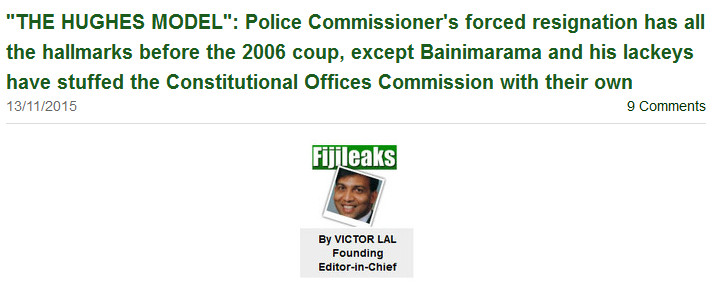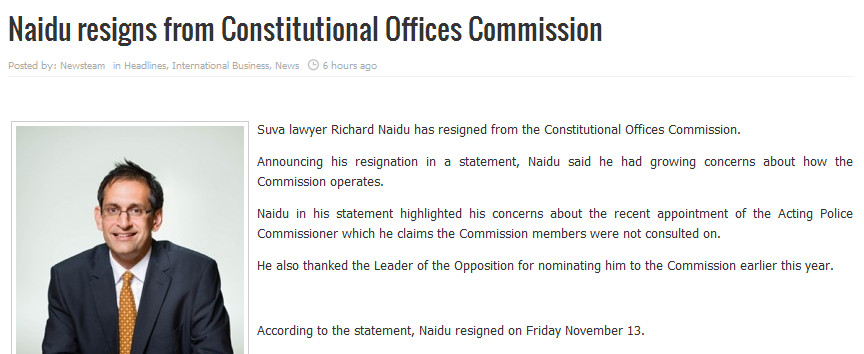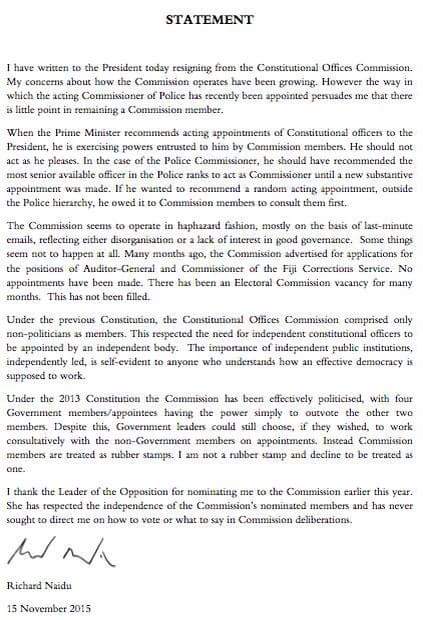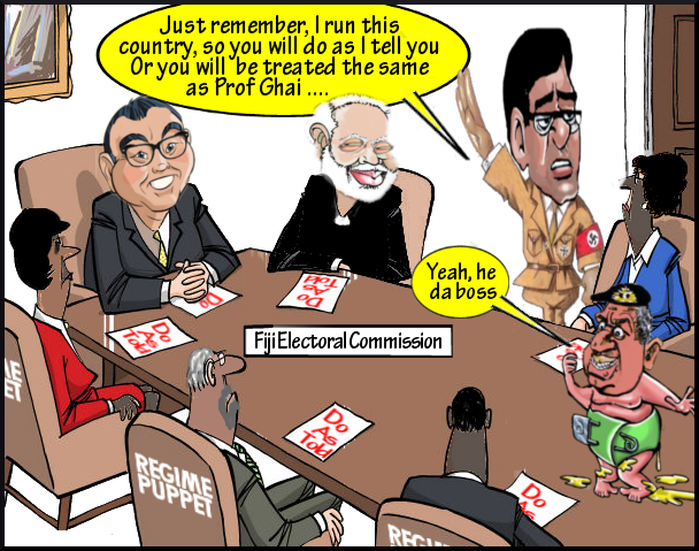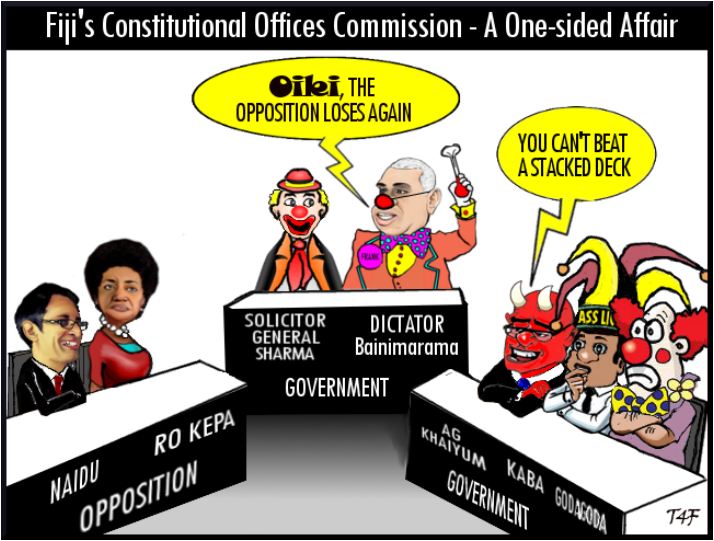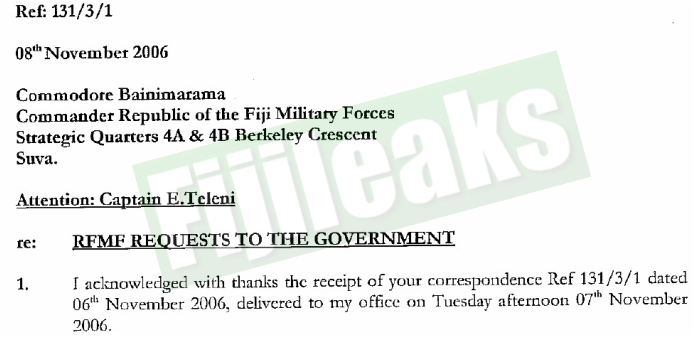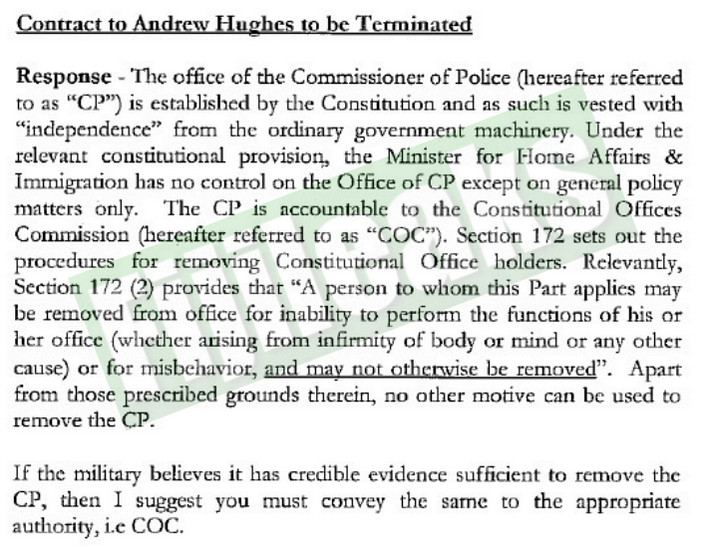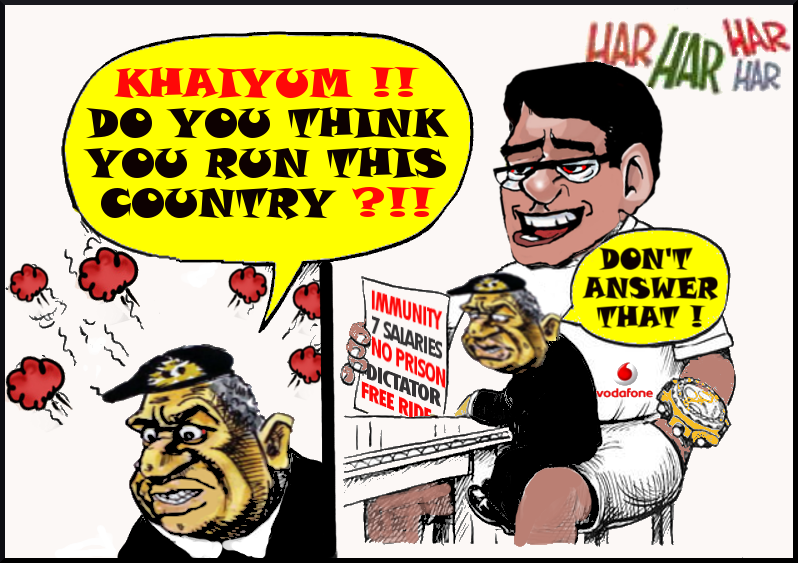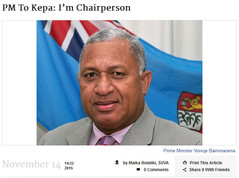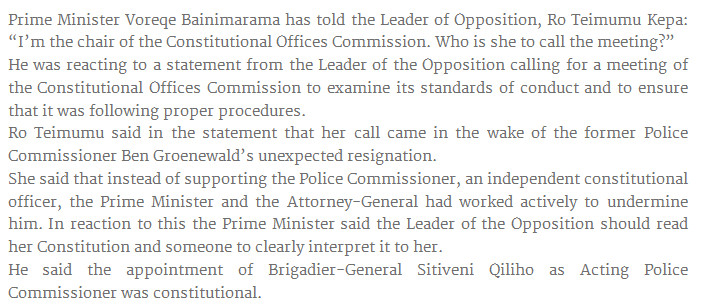For Your Diary: Fijileaks will not be updated between 15-17 November
From Fijileaks Archive: Two irrelevant members on the COC are Ro Teimumu Kepa and Suva lawyer Richard Naidu. Fijileaks calls on the two to resign from the COC!

11/15/2015
At its 17 April 2015 meeting, all the members of the Constitutional Offices Commission (“Commission”) unanimously agreed to the following resolution:
• “Leaves of absence and acting appointments for a period of less than 3 months are to be approved by the Chairperson and the Secretariat;
• Leaves of absence and acting appointments for a period of more than 3 months are to be approved by the Members of the Commission through Flying Minute.”
Interestingly, the former Commission Member Richard Krishnan Naidu (“Naidu”) agreed with the above-cited resolution of the Commission, under which all the members of the Commission unanimously delegated to the Chairperson the authority to make acting appointments for a period of less than 3 months.
At this same 17 April 2015 meeting, the members of the Commission also unanimously agreed that for any urgent matters that require the attention and decision of the Commission, notices and all other relevant documents will be sent to the members of the Commission by email or by fax.
Therefore, the acting appointment to the position of the Commissioner of Police was clearly made in accordance with the above-cited resolution. The appointment of Brigadier-General Sitiveni Tukaituraga Qiliho is for a period of upto 3 months. The above-cited resolution allows the Chairman to make the acting appointment. That is a discretion expressly and unanimously delegated to the Chairperson.
The fact that emails were sent by the Secretariat to all the members for their comments and decision with respect to the extension of the acting appointment of the Commander of the RFMF two weeks ago, is also fully in accordance with the unanimous above-cited resolution passed by all the members of the Commission.
The fact that comments and decision of the members were sought by the Secretariat through a flying minute by email, does not make any member of the Commission a mere rubber stamp as wrongly claimed by Naidu. All members were required to provide their input, comments and their decision. It should be noted that all members including Naidu had unanimously agreed to the above-cited resolution.
The Commission is not politicised, as wrongly claimed by Naidu. Under the Constitution, the Commission has representatives from Government as well as from the Opposition. It must also be noted that apart from the Prime Minister, the Leader of the Opposition and the Attorney-General, the other 3 members of the Commission are not politicians. This constitutional composition of the Commission effectively allows the elected representatives of the Fijian people as well as non-politicians to have an input in the appointment of Constitutional officers. This is the essence of a constitutional democracy.
Even under the 1997 Constitution, before the Commission could make any appointments, the Commission was required by the Constitution to consult respective Ministers and other entities before making any appointment. For example under section 111(2) of the 1997 Constitution, the Commissioner of Police was appointed by the Commission following consultation with the Minister.
Under the 2013 Constitution, once appointed by the President on the advice of the Commission, the independence of the Constitutional officers with respect to their powers, duties and functions is itself expressly guaranteed by the Constitution. For example, section 152(5) of the Constitution in relation to the Auditor-General states that “in the performance of his or her duties or the exercise of his or her authority and powers, the Auditor-General shall be independent and shall not be subject to the direction or control of any person or authority except by a court of law or as otherwise prescribed by a written law.”
Once a person is appointed to an independent Constitution office, he or she is completely independent as provided under Constitution.
If Naidu has chosen to resign from the Commission then that is his prerogative, notwithstanding the fact that the reasons put forward by Naidu are misplaced.
Under section 132 of the Constitution, the quorum for the meeting of the Commission is 3 out of a total of 6 members (that is, the chairperson and 2 other members). As such, Naidu’s resignation will not hinder the functions and duties of the Commission, which it shall continue to perform independently and in accordance with the Constitution.
It is up to the Leader of the Opposition, should she choose to do so, to nominate another member to replace Naidu.
In the meantime, the Commission will continue to perform its constitutional duties. The Secretariat is currently processing the vacancies of Auditor-General and Commissioner of the Fiji Corrections Service (which closed in August 2015) for a decision to be made by the Commission members on the most successful candidates. The Commission has already advertised the vacancy for the position of the Commander of RFMF and will in due course, make a decision on the most successful candidate for this position. The Commission will also be advertising the vacancy of the Commissioner of the Fiji Police Force soon.
The Commission will also at its next full meeting (which shall be called by the Chairperson and not any other individual member of the Commission) make a decision on the vacancy of a single member of the Electoral Commission following the resignation of Dr. Vijay Naidu after the announcement of the elections results last year.
Under the Constitution, the Electoral Commission is made up of a chair and 6 other members and the quorum for the meetings of the Electoral Commission is 4 members. Thus, Dr. Vijay Naidu’s resignation as a member of the Electoral Commission will not hinder the operation of the Electoral Commission with respect to its constitutional duties and functions.
The Commission has and will continue to operate on an independent basis and in accordance with the Constitution. Indeed, neither the Chairperson, the Secretariat nor another member of the Commission has at any time sought to direct any other member with respect to any matter before the Commission. All members are at full liberty to express their views and vote as they deem fit in all the meetings, correspondences, minutes and deliberations of the Commission.

